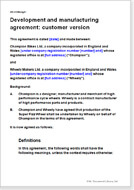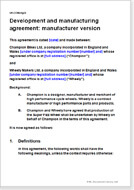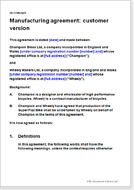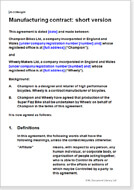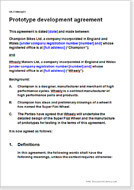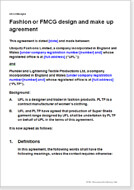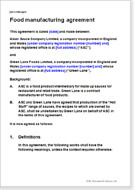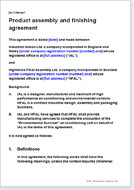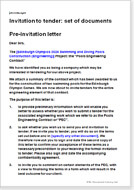Manufacturing agreements
Contracts for you, the customer or client, to have goods manufactured to your order. Some include full design service too, some completion of the design work and some simply “make it”. Wide range of products and circumstances covered including foreign manufacturers. These flexible contracts are strong on IP protection to make sure you get what you pay for. There is also a set of papers to your invitation to tender.
Development and manufacturing agreement: customer version
This contract is for use by any business, to regulate a deal for design and manufacture of any product. Use for engineered product, clothes, furniture or anything else. Suitable home or abroad. Professionally drawn and very thorough. Specification of work to be attached by you or entered in schedule. It is an umbrella version suitable for either a single instruction, or for multiple or continuing orders.
Development and manufacturing agreement: manufacturer version
You are a manufacturer. You have been asked to design and manufacture any product. Use for engineered product, clothes, furniture or anything else. Suitable home or abroad. Professionally drawn and very thorough. Specification of work to be attached by you or entered in schedule. It is an umbrella version suitable for either a single instruction, or for multiple or continuing orders.
Manufacturing agreement: customer version
This manufacturing agreement is for use by any business, to order manufacture of any product. Use for engineered product, clothes, furniture or anything else. The key point is that you are not instructing the manufacturer to finalise design work or add value but simply to make the product for you. It is an umbrella version suitable for either a single instruction, or for multiple or continuing orders.
Manufacturing contract: short version
This manufacturing agreement is for use by any business, for any product. Use for engineered product, clothes, furniture or anything else. The key point is that you are not instructing the manufacturer to finalise design work or add value but simply to make the product. It is an umbrella version suitable for either a single instruction, or for multiple or continuing orders.
Prototype development agreement
This contract is for use by a business in any industry, to regulate a deal for design and manufacture of a prototype product. That could be anything from a range of fashion items to a steering system for railway carriages. Suitable for home or abroad. Professionally drawn and very thorough. Specification of work to be attached by you or entered in schedule. It is an umbrella version suitable for either a single instruction, or for multiple or continuing orders.
Fashion or FMCG design and make up agreement
A contract for a fashion or FMCG business, for design and make up. Use for clothing, shoes, non-regulated medicines, cosmetics, toys, nursery products and many more. Manufacturer may be home or abroad. Professionally drawn and very thorough. Design ideas and details of work to be attached by you or entered in schedule. It is an umbrella version suitable for either a single instruction, or for multiple or continuing orders.
Food manufacturing agreement
A food product development and manufacturing agreement also suitable for drinks, skin care, and other regulated products. You have the ideas. Manufacturer produces examples and prototypes. You order production quantities. Manufacturer may be home or abroad. Recipe / design ideas and details of work to be attached by you or entered in schedule. It is an umbrella version suitable for either a single instruction, or for multiple or continuing orders.
Product assembly and finishing agreement
This agreement covers an arrangement whereby you have some complete unit or most of the parts and you want some other firm, maybe abroad, to add other parts, mark, pack, and make up ready for the market. It is suitable for any industry from clothing to an industrial gizmo. Specification of work to be attached by you or entered in schedule. Manufacturer may be home or abroad. Professionally drawn and very thorough.
Invitation to tender: set of documents
A set of letters and documents which together handle the process of enquiry as to interest, through to submitting the invitation to tender. These documents are drawn to provide a flexible and complete framework for any business, whether in construction, manufacturing, or service provision.

If the document isn’t right for your circumstances for any reason, just tell us and we’ll refund you in full immediately.

We avoid legal terminology unless necessary. Plain English makes our documents easy to understand, easy to edit and more likely to be accepted.

You don’t need legal knowledge to use our documents. We explain what to edit and how in the guidance notes included at the end of the document.

Email us with questions about editing your document. Use our Lawyer Assist service if you’d like our legal team to check your document will do as you intend.

Our documents comply with the latest relevant law. Our lawyers regularly review how new law affects each document in our library.
Extensive contracts for the manufacture of goods
These are full version contracts that cover not just the manufacture of goods, but in most documents, additional services that may be provided by the manufacturer: help with development and prototyping, finishing and assembly, and packaging.
Each agreement template provides you with a template suitable for the transaction described. It is not just a barebones legal contract. We have also taken a commercial view of what you will need. We take you step by step through the process of how your deal will work.
However, because these agreements could be used so widely, we have not included industry-specific requirements. However, you can edit the documents easily to cover any terms specific to your trade or to your circumstances. Most industry-specific additions will relate to technical and regulatory requirements.
Use of a specification of work
In any contract for manufacturing, both sides must agree what work is to be done. The best way to cover this is to attach a specification to the document as a schedule. You do not have to call it a schedule, but it is essential that you bring it into the agreement by referring to it in a way that no-one can misunderstand. The style and layout do not matter.
It is likely that the specification will be discussed and negotiated to a far greater extent than the rest of the document. For this reason, it is a good idea for both sides to sign somewhere at the bottom of each paper page. There is then no scope for pages to be changed. (That happens accidentally far more often than intentionally). Under South African law, it is of course possible to create a binding contract by reference by email, usually as an attachment. However, if multiple versions have been discussed, it is still far safer to rely on paper!
A master contract for repeat work if required
Sometimes, you need a contract for a single deal. At other times, you want to be able to repeat the same business without having to change the terms already agreed. These contracts can all be used for repeat work.
When you have edited the document to your requirements and agreed terms with your counter party, just sign it and exchange parts. That covers your present deal.
If you want to deal with that same party later, on another contract, you can exchange letters or messages with the specification for the new work and refer to the date of this agreement and that the new contract is subject to it. That is all. No special words are required. It just has to be simple and clear. If you do want to change the terms as well, it is usually better to create a new contract by editing your old one.
Strong and extensive intellectual property protection
Today, every business has a vast amount of IP. Think of patents, specifications, know-how, customer lists, manufacturing and marketing records, service records, designs, drawings.
Many lawyers fail to understand the extent and the ease with which someone can steal your IP or the many ways a stranger could use it. We cannot stop theft, but we certainly make sure your intellectual property is strongly protected in these contracts. That serves to assert ownership as well as avoiding disputes with your counter-party.
Another area we cover simply but thoroughly is to give you options on what happens to new intellectual property created in course of development. Who will own a new process, a varied product, a design not used, or a derived product?
If you are concerned about IP issues, you may need to support your manufacturing agreement with an agreement relating specifically to intellectual property.
If your counter party is outside South Africa
There is no reason why you should not use any of these agreements to regulate a deal with a counter party abroad.
Please note however, that none covers specific international trade issues. Where appropriate, the agreements cover transportation, with all incoterms offered, but not export licenses, import regulations and taxes, refrigeration and so on.
Other matters covered in these manufacturing agreements
Here are just some of the provisions we have included, so far as they apply. These points do not apply to every contract version in the same way. Our aim is to produce a document for a purpose - albeit a wide purpose.
The most important provisions are:
- Manufacturer’s warranties
These cover corporate status, identity, qualifications and whatever else you wish to add. That way, you know who you are dealing with.
- Scope of work
This sets out what exactly is the deal. It is not a full specification, but rather describes the main steps you expect from your counter-party.
- Design price and payment
We know that design acceptance is a critical part of a manufacturing contract. A specification cannot usually be precise and complete without prior acceptance of design. That means you will need a process for designing, prototyping, submission for testing and quality assurance - all before a product can be produced in market quantity.
- Cost allocation: who pays for what at each stage of development
- Extensive menus for dealing with transportation and delivery
- A provision to compel the manufacturer to agree to show his plant and facilities to your potential customers or regulatory bodies
- Use of sub-contractors: who, when, and how security is arranged
- An option to cancel the contract if ownership of the manufacturer’s business changes
- Confidentiality
- New designs: who owns in what circumstances
- Rules for publicity and / or announcements
All rights reserved

